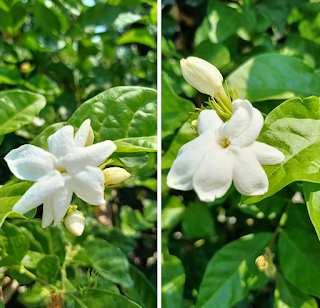Jasmine - มะลิ (Mali) - Jasminum sambac
Hua Hin Services highlights the beauty of Jasminum sambac (มะลิ) — a fragrant symbol of purity and love. This evergreen shrub thrives in tropical gardens, offering sweet-scented blossoms perfect for tea, garlands, and spiritual use.

Jasmine holds significant cultural and symbolic importance in Thailand. In Thai culture, jasmine is revered for its beauty, fragrance, and associations with purity, respect, and spirituality.
1. Symbolism: Jasmine is the national flower of Thailand. It symbolizes purity, gentleness, and motherhood. It is often associated with Thai royalty and is used in various ceremonies and rituals.
2. Ceremonies and Events: Jasmine flowers are commonly used in religious ceremonies, weddings, and festivals throughout Thailand. They are often woven into garlands or used to adorn Buddha statues and shrines as offerings.
3. Traditional Medicine: In traditional Thai medicine, jasmine is believed to have various therapeutic properties. It is used in aromatherapy for its calming and relaxing effects, and jasmine essential oil is sometimes applied to the skin to treat various ailments.
4. Cultural Practices: Thai people have a tradition of wearing jasmine flowers in their hair or as garlands around their necks, especially during special occasions or festivals. The scent of jasmine is believed to bring good luck and ward off evil spirits.
5. Cultivation: Jasmine plants are cultivated in Thailand for their flowers and essential oils. They thrive in the country's tropical climate and are often grown in gardens, parks, and temple grounds.
Jasmine (มะลิ) thrives under Hua Hin’s golden sun ☀️, gracing your garden with its enchanting fragrance and delicate blooms 🌼 throughout the year. With the right organic care, it flourishes effortlessly 🌿, bringing beauty to your space. Want to keep yours thriving and full of blossoms? 🌱
6. Economic Importance: The cultivation and trade of jasmine flowers and essential oils contribute to Thailand's economy. Jasmine essential oil is used in perfumery and cosmetics industries, both domestically and internationally.
7. Cultural Heritage: The importance of jasmine in Thai culture is reflected in various art forms, including traditional Thai dance, music, literature, and visual arts. Jasmine motifs are commonly found in Thai traditional costumes, paintings, and decorative arts.
Overall, jasmine holds a special place in Thai culture, serving as a symbol of beauty, purity, and spirituality, and playing a significant role in various aspects of Thai life and traditions.



Comments
Post a Comment